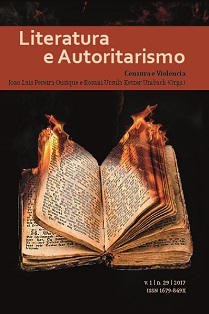Space in "Quem me dera ser onda", by Manuel Rui
DOI:
https://doi.org/10.5902/1679849X23420Abstract
This article aims the accomplishment of a study about the space category. The approach focu-ses on the markedly emblematic work of its time in the contribution’s context to its country literature’s enrichment and periodization. It is the Angolan Manuel Rui’s Quem me dera ser onda (2005). Quem me dera ser onda is a novel that depicts the circumstances of a population that, because of the Revolution (that is, the end of the colonial war, in 1975) tries to adapt to the new reality that is the result of the achie-vements of that Revolution. We can track the movement of suburb’s population towards Luanda urban areas and the challenges, the surprises with which they face this new life reality. Thus, it is narrated Angola’s post-independence events. Quem me dera ser onda has as its fundamental space the Angolan capital, Luanda great city that is going through a new experience due to people’s achievements, a demo-graphical expansion, in an unidirectional movement, from the suburb to the city, to the unknown. We will use an analytical and descriptive methodology supported by space’s concepts of authors such as Reis and Lopes (2000); Paz and Moniz (2004); Umbelino (2011) and especially Bourneuf and Ouellet (1976), who show the oppressive space as prevalent in contemporary novels. Because of the events’ confluence in the space Luanda, we consider it is important to deepen this category in the text.
Downloads
References
AGUIAR e SILVA, V. M. Teoria da literatura. Coimbra: Almedina, 1997.
BAKHTIN, M. A cultura popular na Idade Média e no Renascimento: o contexto de François Rabelais. São Paulo: Ed. da Universidade de Brasília, 1987.
BOURNEUF, R.; OUELLET, R. O universo do romance. Trad. José Carlos Seabra Pereira, Coimbra: Almedina, 1976.
HAMBURGER, K. A lógica da criação literária. Trad. Margot P. Malnic. São Paulo: Perspectiva, 1975.
MARTINHO, A. M. “Ideologia e expressão literária em Quem me dera ser onda de Manuel Rui”. África, Arte e Cultura, 2ª série, nº13, Lisboa, ALAC, 1986.
OLIVEIRA, M. de. Na(rra)ção satírica e humorística: uma leitura da obra narrativa de Manuel Rui. Porto: CEAUP, 2008.
OLIVEIRA, R. T. A configuração do espaço: uma abordagem de romances queirosianos. 2008. 200 p. Tese (Doutorado em Letras) – Universidade Federal de Santa Maria, Santa Maria, 2008.
PAZ, O.; MONIZ, A. Dicionário breve de termos literários. 2. ed. Lisboa: Editorial Presença, 2004.
REIS, C.; LOPES, A. C. M. Dicionário de narratologia. 7. ed. Coimbra: Almedina, 2000.
RUI, M. Quem me dera ser Onda. 8. ed. Lisboa: Cotovia, 2005.
SALGADO, M. T. Carnavalizar é preciso: uma leitura da paródia em Quem me dera ser onda. Mulemba nº 5, Rio de Janeiro: UFRJ, 2011. Disponível em: <http://setorlitafrica.letras.ufrj.br/mulemba/artigo.php?art=artigo_5_5.php,-->. Acesso em: 14 set. 2014.
UMBELINO, L. A. Espaço e narrativa em Paul Ricoeur. Revista Filosófica de Coimbra nr. 39, p. 141-162, 2011. Disponível em: <http://www.uc.pt/fluc/dfci/publicacoes/espaco_e_narrativa_em_p.ricoeur>. Acesso em: 24 out. 2014.
Downloads
Published
Versions
- 2022-03-16 (2)
- 2017-08-02 (1)
How to Cite
Issue
Section
License
DECLARAÇÃO DE ORIGINALIDADE E EXCLUSIVIDADE E CESSÃO DE DIREITOS AUTORAIS
Declaro que o presente artigo é original e não foi submetido à publicação em qualquer outro periódico nacional ou internacional, quer seja em parte ou na íntegra. Declaro, ainda, que após publicado pela Literatura e Autoritarismo, ele jamais será submetido a outro periódico. Também tenho ciência que a submissão dos originais à Literatura e Autoritarismo implica transferência dos direitos autorais da publicação digital. A não observância desse compromisso submeterá o infrator a sanções e penas previstas na Lei de Proteção de Direitos Autorais (nº 9610, de 19/02/98).






